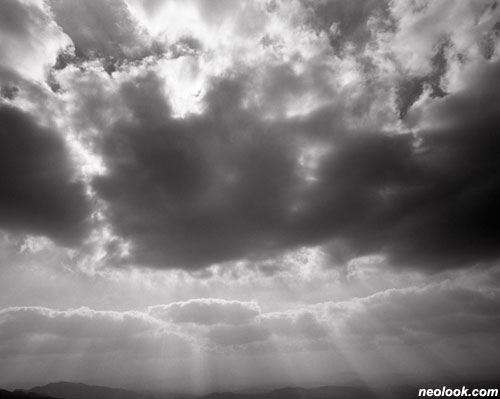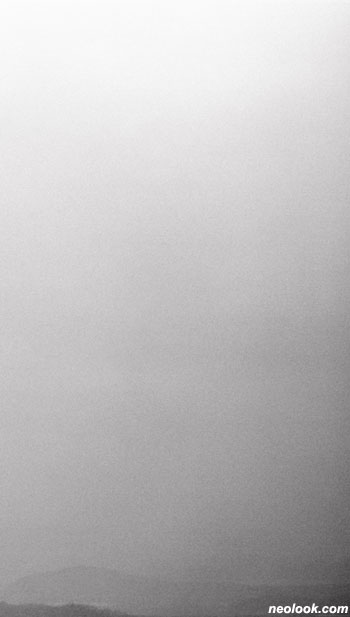- ● homepage
- ● archives
- ● restoration
- ● books
- ● big banners
- ● post board
- ■ neo's search
- ■ about us
- ■ 게재방법 안내
- 개인정보처리방침

- [email protected]
- Tel. 02_335_7922
- Fax. 02_335_7929
- 10:00am~04:30pm
- 월요일~금요일
- 3/3(월) 대체공휴일

먼 산 The Distant Mountains
박정훈展 / BAHK J-HUHN / 朴廷訓 / photography 2011_0308 ▶ 2011_0330 / 일요일 휴관

- 박정훈_먼 산_피그먼트 프린트_57.5×87.5cm_2011
초대일시 / 2011_0308_화요일_03:00pm~08:00pm
아트토크 / 2011_0312_토요일_03:00pm 런치토크 / 2011_0318_금요일_12:00pm * 프로그램 참가신청 (참가비 무료) www.shinhanmuseum.co.kr < 정보마당 < 교육행사 < 신청하기
관람시간 / 10:00am~06:00pm / 일요일 휴관
신한갤러리 SHINHAN MUSEUM 서울 중구 태평로 1가 62-12번지 신한은행 광화문지점 4층 Tel. +82.2.722.8493 www.shinhanmuseum.co.kr
우리 마음에는 저마다의 먼 산이 있다 ● 우리는 먼 산을 보았다. 매일같이 다니는 길 위에서, 차가운 빌딩 숲 사이에서, 어디론가 향하는 차창 밖에서. 밤이 시작되는 어스름 속에서 혹은 모두가 잠들어 있는 미명 가운데에서. 그렇게 우리는 분명 먼 산을 보았다. '먼 산'을 통해 우리는 무엇을 보게 되는가. 선율처럼 너울거리는 무정형의 능선. 먹의 농담처럼 중첩된 산. 무한의 세계처럼 펼쳐진 하늘. 소리 없이 쌓였다 흩어지는 사막의 모래와 같은, 차오름과 비워냄을 반복하는 조수와도 같은 움직임. 여기에서 우리는 일종의 숭고미와 맞닿게 된다. 칸트는 너무나 거대하고 강렬해서 적절하게 재현할 수 없는 무언가와 마주할 때 생겨나는 것이 숭고라고 설명한다. 우리가 자연의 거대함에 압도될 때 감동과 경외, 그리고 겸허함마저 느끼게 되듯이. 그러나 자연에서 절대적으로 큰 것은 없으니 숭고함은 본디 자연 그 자체가 아니라 그것을 품는 마음으로부터 발현된 것이리라. 소동파는 "대나무를 그리려면 마음 속에 대나무가 담겨 있어야 한다"고 했다. 지금 바라보는 '먼 산'은 이미 우리 마음 속에 담겨 있던 자연의 심상과 작가가 바라 본 먼 산이 포개지는 지점이다. 그것은 고정된 점이 아니라 새로운 의미들이 뻗어나가는 무수한 오솔길이다.우리가 「먼 산」에서 얻게 되는 것은 그 어떤 예술적 개념이나 사진적 담론이 아니다. 이 일련의 작품들은 우리 마음 속에 웅크리고 있는 바로 그 산을 다시 한 번 찬찬히 들여다보게 하고 그 계기를 통해 저마다의 먼 산을 조심스럽게 끄집어 내게 한다, 프루스트의 홍차처럼. ■ 김남은

- 박정훈_먼 산_피그먼트 프린트_50×81cm_2011
비어 있음과 차 있음이 세계의 운동, 즉 변화로부터의 지속적 흐름이 도달하는 양단(兩端)임을 이 산에 올라 먼 곳의 저 산을 보며 깨닫는다.

- 박정훈_먼 산_피그먼트 프린트_86.5×50cm_2011

- 박정훈_먼 산_피그먼트 프린트_50×83cm_2011
마치 빛과 어둠이 대립적 실체가 아닌 밝기의 차이이듯, 허(虛)와 실(實) 또한 그 차이 속을 무수히 오가며 흩어졌다가 모이고 다시 흩어지는 우발적 계기일 따름이다. 만월이 되는 그때 달은 기울기 시작한다.

- 박정훈_먼 산_피그먼트 프린트_100×119cm_2011
고정된 것이 산이고, 비어 있는 것이 허공이라 말하지 말자. 하나가 다른 하나의 바탕이 된다는 기능을 부여하지 말자. (차라리 서로가 서로의 근거로서 존재한다고 하자.) 보이는 것 너머 이데아의 세계를 설정하지도 말자. 우리가 정의한 것은 아마도 그것 밖에 있을 것이다.

- 박정훈_먼 산_피그먼트 프린트_100×56.5cm_2011
이 일련의 작품들이 차라리 하나의 빈 배가 되기를, 그래서 그곳에 우리의 마음을 싣고 강 저편으로 갈 수 있기를. 강물을 건넜다면 타고 온 배를 잊어도 좋다. 자신만의 먼 산을 향해 내딛는 여정의 시작. ■ 박정훈

- 박정훈_먼 산_피그먼트 프린트_85×74.5cm_2011
Every mind has its own distant mountains ● We have seen the distant mountains, on the streets we come and go everyday, in the grey forest of buildings, through the window of a car leaving for somewhere, in the coming of night, or in the hour of dawn. Truly, we have seen the distant mountains in those ways. What do we see from Bahk J-huhn's series of works, The Distant Mountains? Amorphous ridge as a weltering melody. Mountains piled on mountains drawn in light and shadow. The spreading sky above the infinite world. Or movement that is like desert sands assembled and disassembled in silence, or cycles of flowing and ebbing tides. We encounter a kind of the sublime through what we see from the works. According to Kant, the sublime appears in our mind when we meet something huge, intense and unrepresentable, as we stand in impression, respect, even modesty of the nature's greatness. However, the sublime is not originally manifested from the nature but mind bearing it because there is no absolute greatness. Before a painter portrays a bamboo, there must be the bamboo in the painter's mind, said Su Shi. The Distant Mountains we are looking at is a meeting place for the nature's image we embraced and the mountains the artist gazed at. The place is not a fixed space, but countless footpaths to be extended for new meanings. What The Distant Mountains hands us may not be a certain artistic conception or photographic discourse. As the Proust's tea, the series of works is a chance to make us carefully gaze at the mountains crouching in our mind once again and raise up them of our own. ■ KIMNAMEUN
On a mountain here, gazing at another mountain in the distant over there, I realize that emptiness and fullness are both ends where the world's movement, the constant flow from change heads for. As light and dark are not opposing substances but a matter of brightness, emptiness or fullness is a contingent occasion of repetitive, circular movement exchanging between the differences, fusion and diffusion. The moon begins to wane as it becomes full. We should not tell the mountains represent fullness and the air represents emptiness. We should not give one of them a function as the basis for another one; we'd rather think they become the grounds for each other. And we should not create an Idea beyond the visible. What we define would fall outside of what is defined by us. I hope for my works to become a vacant boat, and your mind to cross the river in the boat. It would be better to forget the boat after crossing. This is the beginning of a journey to search for the distant mountains of your own. ■ BAHK J-HUHN
Vol.20110206d | 박정훈展 / BAHK J-HUHN / 朴廷訓 / photography
